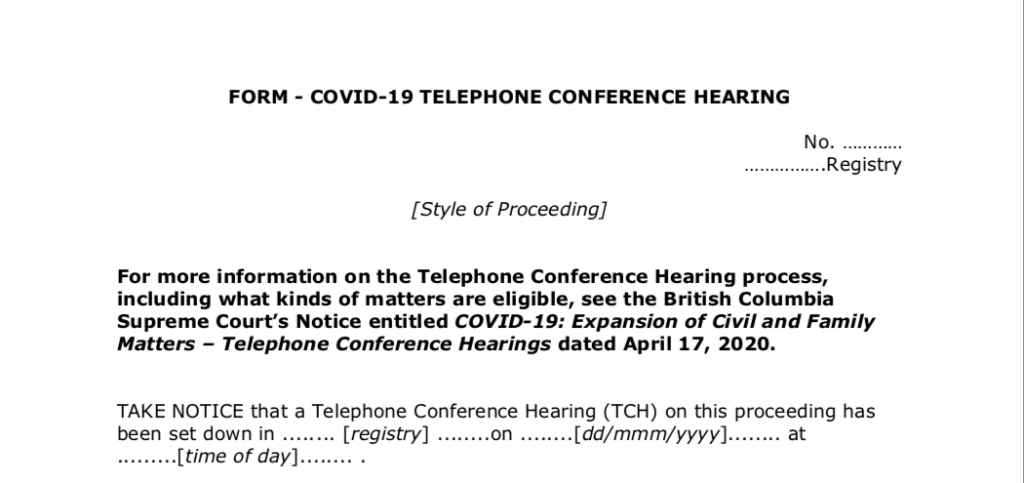Effective today, COVID-19 Telephone Conference Hearings (or “TCH”s) are B.C.’s newest process for hearing Civil and Family matters in the unfolding COVID-19 situation.
The new E-Hearings mean that the Supreme Court of British Columbia can expand what matters it will hear using a process that includes: the BC Courts Scheduling website, a new TCH form, a new TCH Brief requirement, and e-filing (where possible).
Parties bringing a COVID-19 TCH will want to check the Announcements on the Courts of British Columbia website for any updates on process.
Here are five tips to help you succeed in these new E-Hearings:
1. Confirm that your matter is eligible
COVID-19 Telephone Conference Hearings are only available for matters that were previously scheduled for hearing between March 19, 2020 and May 1, 2020.
2. Follow the Court’s new process and stay within the set limits.
Parties must:
(a) Schedule the COVID-19 TCH online on the BC Courts Online Booking System. You will need a BCeID.
(b) With the scheduled date in hand, fill out the new online form titled: “FORM – COVID-19 Telephone Conference Hearing”.

(c) Stay within the limits set by the Court. The Court’s April 17, 2020 Notice on COVID-19 TCHs, [Editor’s Note – this was replaced by an updated Notice on COVID-19 TCHs dated April 24, 2020] provides a list of restrictions, including:
- TCH’s are limited to one hour.
- The matter is limited to one disputed issue, or (if the matter involves more than one issue) the parties have reached consent on some or all of the issues;
- The disputed issue must be suitable for determination
- by telephone; and
- on the basis of a single affidavit filed per party, no longer than 10 pages [Editor’s Note – according to the April 24 Notice, the 10 pages includes exhibits.]
(d) Follow the special timelines for filing and serving documents.
(e) Submit a “TCH Brief” the day before the hearing. The TCH Brief must be emailed to Supreme Court Scheduling (Appendix A of the Court’s Notice provides emails for each region in B.C). All parties must be copied on the TCH Brief email. The TCH Brief must include:
- the completed FORM – COVID-19 Telephone Conference Hearing;
- the Scheduling Party’s affidavit (if filed) and written submissions (if any);
- the Respondent Party’s affidavit (if filed) and written submissions (if any); and
- any pleadings that will be relied on at the TCH (e.g., petition, response to petition, notice of civil or family claim, response to civil or family claim, reply, counterclaim, response to counterclaim, third party notice, and/or response to third party notice).
- Presumably, the parties will also submit authorities upon which they intend to rely.
3. Negotiate
Parties only have one hour, and the Court will only hear one disputed issue. You may choose to see this as an opportunity to negotiate solutions for your client on as many issues as possible. Indeed, the Court encourages parties to discuss ways of narrowing the disputed issue to make best use of the COVID-19 Telephone Conference Hearing.
4. Plan how to use your documents at the E-Hearing
Take some time and think about how you will navigate the documents in the “TCH Brief”. During last week’s live-stream of a virtual hearing in Ontario, parties regularly referred to the challenge of directing the court and other parties to certain pages.
With thoughtful planning, this need not be the case. The UK judiciary regularly reminds people that easily accessing and referencing electronic documents in remote hearings is an essential to success.
As long as the Court remains in the telephone environment, you will not be able to use a visual cue to help the judge and other parties find a document you believe is important to your case.
In particular, consider:
- How big is the final TCH Brief? The TCH Brief must be emailed to the court and all parties. Will it need to be split into more than one PDF? If so, how will you refer to the different PDFs?
- How will you direct the court to a paragraph in an authority? By the e-page in a Book of Authorities? Or by a tab number and the page in the Authority itself?
- Will both parties have separate books of authorities? If so, how will you refer to them?
- You only have an hour – If there are delays in finding documents, how will this affect your presentation?
5. Keep checking the BC Court website for updates.
The B.C. Court announced the COVID-19 TCHs on Friday, April 17, 2020.
Why these tips matter: As lawyers, our job is to be an advocate for our client, and to be the best we can in whatever forum we are in.
If the forum changes – for example, to COVID-19 Telephone Conference Hearings – then we can best serve our clients by thinking through not just their substantive case, but also how we will provide the best advocacy we can using these new legal processes and procedures.

